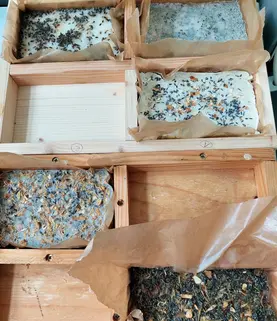Why study "Didactics of Natural Sciences"?
Study with us and benefit from a practice-oriented, varied and customisable degree programme.
Practical studies
The Didactics of Natural Sciences programme in Bamberg offers a practical course of study: whether you are studying Didactics of Biology for Primary or Secondary Schools, Didactics of Chemistry for Primary or Secondary Schools or Mathematics and Science Education (MNE) - we focus on the application of the knowledge you have acquired. Our seminars include numerous practical references that help you to apply your theoretical knowledge directly in the classroom. We prepare you for your future everyday school life with excursions to extracurricular learning centres, practical exercises and short and long-term scientific experiments related to teaching. You can also complete your internships with us as part of the teacher training programmes with biology as a teaching subject for primary or secondary schools.
Exciting science projects
During your studies in science education, you will have the opportunity to take part in a variety of exciting projects. Our programmes range from the development of new teaching materials to the implementation of research projects and innovative teaching methods. The DiKuLe wild bee project and City4Future are particularly worthy of mention. In the wild bee project, which was developed as part of our DigiLab, you will learn how you can sensitise pupils to nature conservation and actively involve them in environmental protection measures as part of a citizen science project. City4Future focusses on sustainable urban development and offers you the opportunity to work in an interdisciplinary way and develop practical solutions for urban environmental problems.
Elective options
Our elective seminar programme includes a variety of seminars that can be individually tailored to your interests.
Insights into our elective courses
Beekeeping at schools (theory and practice of apiculture)
The seminar provides an overview of the annual beekeeping process and enables students to keep and care for their own bee colony. The students have the opportunity to receive their own offshoot of a bee colony and are supported beyond the seminar in the keeping and care of their bee colony.
Mushroom Growing in the Classroom as an Example for "Social Entrepreneurship"
The seminar offers students the opportunity to immerse themselves in the fascinating world of fungi and learn about their sustainable use as food, plastic decomposers or building materials. In the practical part, you will learn how to grow mushrooms and apply this knowledge in the classroom, for example in the form of a student company. The aim is to awaken enthusiasm for mushrooms and demonstrate concrete approaches to sustainable development. The seminar is sponsored by the GRIPS-initiative (practical start-up and innovation in higher education).
Medical Plants in Science Education
The diverse world of medicinal plants is an opportunity to get pupils interested in botany. In this seminar, students learn about botanical characteristics, important plant families as well as the use of numerous known and unknown medicinal plants. The practical focus is on activities that can be easily embedded in daily lessons or are suitable for workshops, school clubs and project days. The design of a school garden and the creation of herb beds are also part of the seminar. Where possible, links to the relevant curriculum will be made. The production of simple cosmetics, soaps or healing ointments is another practical focus of the seminar.
Scientific Short and Long Term Experiments in Grade 1 to 6

Experimenting is fun! However, experimentation should not be an end in itself, but should provide new experiences and insights.
In this seminar, students learn about a variety of experimentation possibilities from all areas of science, which are designed to be age-appropriate and relevant to the curriculum. They will develop their own ideas for experiments, work on them together and examine them critically.
In the area of long-term experiments, there is also room for seasonally adapted observations of nature.
Scientific Short and Long Term Experiments in Grade 1 to 6

Experimenting is fun! However, experimentation should not be an end in itself, but should provide new experiences and insights.
In this seminar, students learn about a variety of experimentation possibilities from all areas of science, which are designed to be age-appropriate and relevant to the curriculum. They will develop their own ideas for experiments, work on them together and examine them critically.
In the area of long-term experiments, there is also room for seasonally adapted observations of nature.
Scientific Short and Long Term Experiments in Grade 1 to 6

Experimenting is fun! However, experimentation should not be an end in itself, but should provide new experiences and insights.
In this seminar, students learn about a variety of experimentation possibilities from all areas of science, which are designed to be age-appropriate and relevant to the curriculum. They will develop their own ideas for experiments, work on them together and examine them critically.
In the area of long-term experiments, there is also room for seasonally adapted observations of nature.



